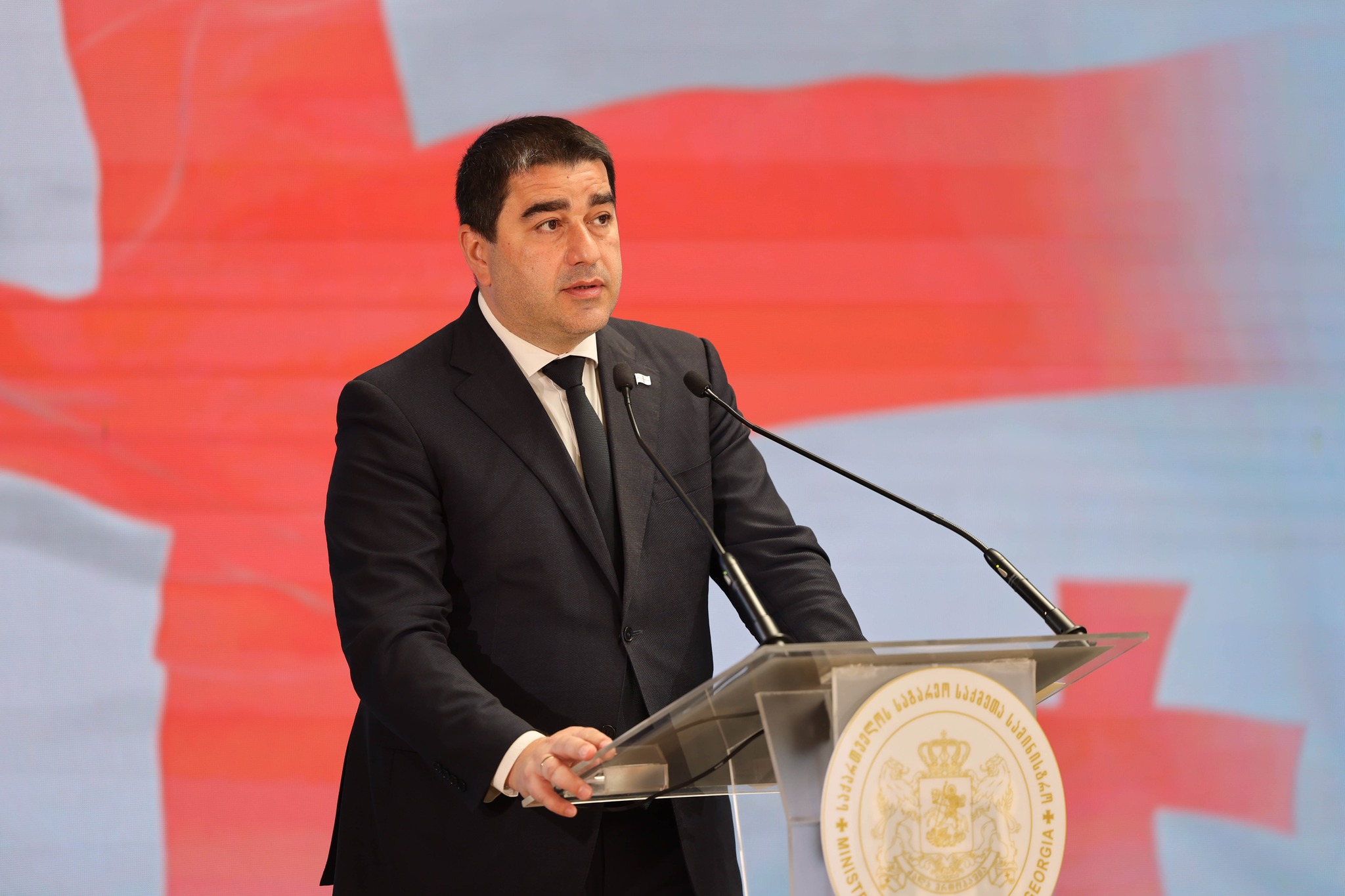The ruling Georgian Dream party said it is appealing to the country’s Constitutional Court to ban three key opposition forces – the United National Movement, Ahali/Coalition for Change, and Strong Georgia/Lelo – while warning that other smaller groups “closely related” to them, including Droa, Girchi – More Freedom, Strategy Aghmashenebeli, European Georgia, Federalists, and Republicans, could face similar action.
According to Parliament Speaker Shalva Papuashvili, who presented the appeal during an October 28 briefing, the move will not affect “associated individuals” of the parties deemed unconstitutional, despite recent legislative amendments allowing such actions. The appeal also spares ex-PM Giorgi Gakharia’s opposition For Georgia party, whose members today took their seats in the disputed parliament after a yearlong boycott.
“Along with other violations, the evidence shows that respective political parties have, in a practically constant manner, denied both the domestic political and foreign policy legitimacy of the current Georgian government and ruling political party, and thus its constitutionality,” Papuashvili said. “In doing so, these parties acknowledge that between themselves and the ruling party, one of the parties must be declared unconstitutional.”
In the legal reasoning, Papuashvili cited, among others, human rights records under UNM, the previous administration’s actions related to the 2008 August war, the opposition’s boycott of previous elections, as well as their alleged “support” of “foreign force” in undermining Georgian independence.
The Constitutional Court, widely seen as loyal to Georgian Dream, has nine months to deliberate on the appeal and decide whether to ban the opposition forces. Judge Irine Imerlishvili recently resigned as the appeal was being prepared, later explaining her decision by citing a job offer in the private sector. GD-elected President Mikheil Kavelashvili has already appointed Giorgi Modebadze as a new judge to the Court.
The appeal is based on a voluminous report by the disputed Parliament’s temporary investigative commission, chaired by Georgian Dream veteran Tea Tsulukiani, which examined alleged crimes committed by former officials.
Appeal
The appeal invokes Article 23 of the Georgian Constitution, which deems inadmissible the establishment and activity of a political party “that aims to overthrow or forcibly change the constitutional order of Georgia, infringe on the independence or violate the territorial integrity of the country, or that propagates war or violence or incites national, ethnic, provincial, religious or social strife.”
In its legal reasoning, Georgian Dream cited, among others, opposition’s attempts “to overthrow or forcibly change the constitutional order of Georgia,” including through alleged mass human rights abuses under UNM rule as well as moves by opposition parties in 2016-2024 to contest the results of several elections, as well as “six direct attempts” at such in 2019-2024.
GD also alleged instances of “infringing on the independence or violating the territorial integrity of the country,” including “events associated with the August 2008 war,” during which, it claimed, “Georgia’s then-government prepared the ground for the occupation forces to invade the Tskhinvali region.”
Papuashvili cited, among others, the 2004 “armed confrontation directed at Tskhinvali” by Georgia’s then-government, former President Mikheil Saakashvili’s 2006 decree renaming the Kodori Gorge as “Upper Abkhazia,” and the “alternative unconstitutional elections” held in November 2006 in the Tskhinvali region, which he claimed “gave indirect legitimacy to the separatist elections […] and amounted to an open and gross betrayal of Georgia’s state interests.”
He further alleged that in 2007, “Georgia’s then-government created a temporary administrative-territorial unit on the territory of the former South Ossetian Autonomous Oblast and legally restored the borders of the South Ossetian Autonomous Oblast that had been abolished in 1990.”
Papuashvili claimed that all these actions culminated in the August 2008 war, after which Georgia’s then-government supported the PACE resolution of October 2, 2008, which, he said, “acknowledged its own actions in escalating to a new stage of open and full-scale military operations, while describing Russia’s military intervention as a ‘counter-attack.’”
The ruling party argued that similar attempts continued “since 2012,” including after Russia’s full-scale invasion of Ukraine in 2022, when opposition parties, according to GD, sought to “escalate the conflict between Georgia and the Russian Federation to the maximum extent.”
“Unconstitutional political parties to this day are trying to escalate the situation between Georgia and Russia in the same form and degree as the [United] National Movement was doing this before the 2008 war,” Papuashvili claimed.
According to Papuashvili, since 2012, opposition parties have also supported a “foreign force” in “infringing on Georgia’s independence” by seeking to “punish” the Georgian state and government from abroad, to fuel discontent among citizens, to incite them “to confront their legally elected government,” and to use these processes “as a mechanism of sabotage.”
He listed several “harmful actions,” including the mentioned parties’ attempts to damage Georgia’s visa-free regime with the EU, hinder the country’s progress toward EU membership, and conduct “systematic informational attacks from abroad, attempts to impose sanctions, and facilitating this” against the Georgian state and government.
The ruling party is not, at this stage, asking the Constitutional Court to ban the political activities of specific individuals, whether non-partisan or affiliated with the targeted parties. Papuashvili explained that “today, the legislation defines the institution of a successor party, which provides broader opportunities to prevent future unconstitutional political activities by members of banned parties.”
This post is also available in: ქართული
